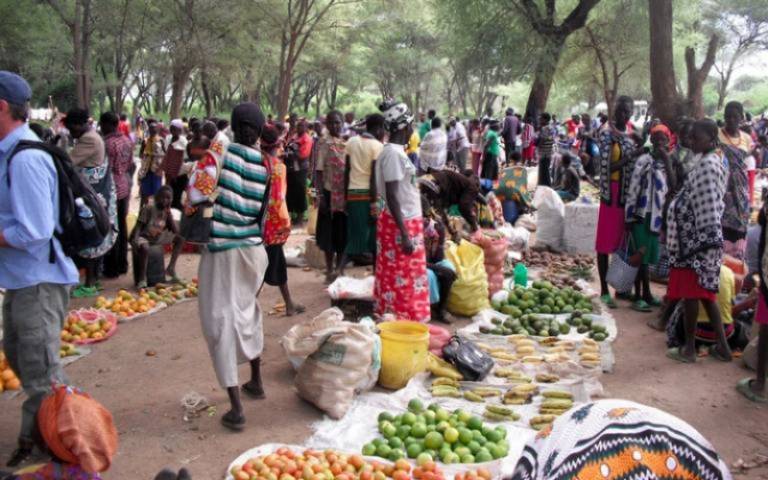Prosperity Co-Lab (PROCOL) Africa is an innovative collaborative research programme seeking to broaden the discussion of what constitutes prosperity in Africa

Led by the Institute for Global Prosperity in close collaboration with local partners, our research harnesses cutting edge science, community knowledge, astute policy development and participatory research methods to develop smarter, localised understandings of prosperity that can be tailored to communities across Africa.
Looking ahead to the challenges Africa faces, notably climate change, urbanisation and the future of work it is clear a new vision encompassing natural prosperity will be needed to create communities that are sustainable, autonomous and resilient. While Kenya embodies many of the challenges faced across sub-Saharan Africa, we also see it as a hub of innovation and inspiration that is fostering African solutions to global problems.
Read more on the Procol Kenya website.
Find out more about who we are.
Our projects
- Marakwet Research Station and Citizen Scientists
The Marakwet Research Station is situated in Tot-Sibou Village in the Kerio Valley, north-west Kenya. All work is embedded in the Marakwet community.
Independently working from this research hub is a highly experienced team of Citizen Scientists who are trained in interview techniques, oral historical recording, photography and filming, GPS mapping, and translation and transcription. The Marakwet Citizen Scientist team are Timothy Kipkeu (Director) and Helena Cheptoo (Assistant Director), Nelson Bailengo, Andrew Kibet Yano, Noah Kiplagat and Joseph Kimutai.
This team work closely with the IGP on a wide range of topics, including:
- mapping of landscape features (field systems, land-tenure, irrigation features)
- issues of cropping and farming practice
- mapping of social and ceremonial landscapes recording oral histories, ceremonies and public events
- recording political events and speeches surveys of market trends arrangement of interviews and focus groups
- Prosperity and innovation in the past and future of agriculture in Eastern Africa
This project aims to reframe how we understand and support smallholder farmers Eastern Africa by focussing on innovative, self-defined ‘digital farmers’ in Elgeyo-Marakwet County (EMC), Kenya. Approximately 85% of total agricultural output across the African continent is produced by smallholder farmers, with the smallholder farming sub-sector accounting for 75% of Kenya’s total agricultural output. Yet there remains a persistent imagining amongst some academics, policy-makers and NGOs that African farming practices are static, inefficient and inherently vulnerable in the face of environmental change and population growth.
This project argues that this assessment is highly reductive, being deeply rooted in colonial development epistemologies. By working with smallholder farmers EMC, we are instead to exploring how farmers in Eastern Africa are highly creative and innovate in their daily practices. Working with multi-sectoral partners active in food systems research and delivery, we are challenging the ‘modernisation’ imperative by historicising contemporary farming practices and diachronically exploring recent and ongoing processes of innovation, improvisation and ingenuity that seem to have been characteristic of African farming for centuries. Comprehending these dynamics in a more nuanced and detailed manner can in turn help provide the foundation for locally led pathways towards new prosperous futures for farming livelihoods in East Africa.
- Ethiopia Control of Bovine Tuberculosis Strategies (ETHICOBOTS)
The Ethiopia Control of Bovine Tuberculosis Strategies (Ethicobots) project aims to tackle Bovine tuberculosis (BTB) in Ethiopia, both directly and by addressing its broader consequences.
Ethiopia has the largest livestock population in Africa and an increasing BTB burden. There are major implications for those who work with and live alongside infected cattle and rely on cattle products for their livelihoods.
Ethicobots is a £2.9m multidisciplinary research programme funded by the Zoonoses & Emerging Livestock Systems research initiative. It combines partners in UK and Ethiopian institutions, including veterinary scientists, epidemiologists, geneticists, immunologists and social scientists.The IGP input relates to how information about the disease can be communicated between farmers and other stakeholders to better understand patterns, providing farmers and communities themselves with the tools and knowledge to identify, report and deal with outbreaks. Integral to both research threads will be the involvement of citizen scientists recruited from the local communities.
 Close
Close

